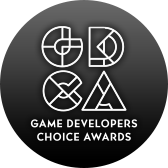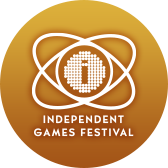"You don't need great complexity to touch people."
In advance of GDC Next, which runs in Los Angeles next week, GDC director of online community Patrick Miller talked to Toejam & Earl creator Greg Johnson about the inspiration behind HumaNature Studios's upcoming Doki-Doki Universe [trailer], which is currently slated for a December release for PS3, PS4, PS Vita, and mobile.
Johnson will be speaking about Doki-Doki Universe in his GDC Next 10 talk in LA on Tuesday, Nov. 5th titled "Doki-Doki Universe: Sweet, Simple and Genuine".
Patrick Miller: I can't think of many devs that would describe their game as "Sweet, simple, and genuine." What goes into creating an emotion-based game? How did you approach the design/dev process differently?
Greg Johnson: One thing I have learned in 32 years of game development... and I will quote a wise friend of mine here, Mike Badillo: "Game development is hard." It doesn't matter if you're creating an emotion-based game or not, the development path for every game is a constant stream of challenges, creative problem solving, negotiation and compromise, all under extreme time pressure.
That said, if you set your sights on wanting to create a game with emotional impact you have an extra layer of challenge. That's because you still have to do all the other stuff as well. You still need all of the goal-oriented mechanics, puzzles, action, world-building, etc. etc. You also need some extra skills set on your team, basically people who can write really well, and artists of top caliber who can move people through the sensitivity in their work.
We won't get into what "emotionally based" game means here, as that's a big question unto itself, but we can perhaps just give a nod to a few of those games out there that have attempted to make headway in this space. They might be big triple-A blockbusters like The Last of Us, or BioShock, Assassin's Creed, Deus Ex, Final Fantasy, or Beyond Two Souls that focus on story and production values.
They might be medium-sized games that take more chances, like ICO, Shadow of the Colossus, Journey, Heavy Rain, Rain, Fable, Beyond Good and Evil, The Two Brothers, The Walking Dead... or they might be small indie games that really try something new, like Facade, Year Walk, Flow, Flower, or Hohokum. Obviously there are many more. Emotionally-based can mean many different things.
Now, if you are really a thrill-seeker, and you want to test how you stand up to extreme stress, you will decide to shoot straight for the toughest of all nuts to crack, and that is interactive story that is set in a simulation type of environment. Basically what we refer to as generative, or emergent story and simulated personality. That's basically the "Holodeck" brass ring.
I can't say we really tried to crack that nut wide open with Doki-Doki Universe. I'm a risk-taker, but not that crazy. When you have a small new team on multiple brand-new platforms, with no game engine and a tight deadline, you don't want to try and compress a six-year R&D project into a year and a half.
That said, we still tried to take a shot at creating something that is simple, sweet and genuine, and we tried to achieve some new things in this space. Why simple and sweet? Well, we started with a pile of artwork that was originated by another friend (I-wei Huang) and if it's anything, it is simple and sweet.
I really wanted to bring that world to life. I believe that one of the things we discovered is that you don't need great complexity to touch people. All you really need is to create stories and characters that are genuine and meaningful. Hopefully, there is a little of that in Doki-Doki Universe.
PM: What inspired you to make Doki-Doki Universe?
GJ: Hmmmm. Is it too weird to say that one is inspired by one's own game? Maybe that's just obnoxious. Anyway, I think I have to say it. If you've played one of my earlier game series, Toejam and Earl, you'll see some strong similarities to Doki-Doki Universe. I wanted to create another crazy diverse universe that players could have fun exploring.
Another game would be Animal Crossing. Few games offer the sense of a "living world" like that does, and I really wanted that feeling that "life happens here" and everyone has a purpose. Scribblenauts, LittleBigPlanet, The Sims, and Spore might be a few others. The Sims and Spore are simulation games that create living worlds, with state-based behavior, and we used a lot of similar ideas in Doki-Doki Universe.
In a more, um, spiritual realm I guess I would say I was deeply inspired by a few things like the game ICO, which showed me for the first time how emotionally compelling a virtual relationship could be. And perhaps Journey, which has little in common with our game other than the fact that it bravely attempts to be be art and to touch an emotional chord in people.
The classic book "The Little Prince" was a big inspiration, as you will immediately see with our little planetoid worlds, each with their own crazy inhabitants and warped view of life. Akira Toriyama and his manga series Dr. Slump with Arale-chan is another inspiration. Sometimes I think of our game as sort of an interactive manga, and I love Toriyama's sense of humor. My biggest and deepest all-time inspiration, though, is Hayao Miyazaki. The amount of heart he puts into his work, and the way he and his studio touch people is what I hope to do someday in the interactive realm.
In regards to the emotional experience that defines Doki-Doki Universe, and perhaps sets it apart from most other games...Well, the best I can do there is tell you what we were shooting for; you'll have to be the one who tells me if we succeeded or not. The theme of our game is "Humanity and Self-discovery".
Our hope is that we can make people smile, and care a little bit about the various characters that inhabit our worlds. If we're lucky, some of our players may gain some small insights about themselves, or feel charmed by our simple little universe. Not too many games out there shoot for that emotional space, I suppose.
PM: Tell me more about the "interactive story" aspect of Doki-Doki Universe; what kind of problems have you run into (and solved or worked around)?
GJ: Imagine you entered a game world where all of the characters were going about their business with a sense of purpose. You could follow them around, assuming they didn't mind, and watch them do things that made sense. Then you could interact with them in a wide variety of ways that caused them to react to their "interpretation" of your intentions.
Any NPC's reaction would be based on the what the NPC was doing or caring about at the time (their contextual state), the NPC's current relationship state with you, the NPC's current mood, and any "world states" (i.e. world events, or maybe story chapters) that might be relevant. Imagine that the things you did, or said, would change the conditions for individual characters in lasting ways, affect your relationships with them and with other NPCs who "cared", and alter the conditions of world states, which NPCs could perceive and react to. Your actions would dramatically impact the course of events in the world.
You would do all of this with a sense of purpose and clear idea of goals and success, and some captivating story, unique to your experience and based on all of your choices, would emerge. This would come to some climax and then some satisfying conclusion. Phew! Deliver that and you have the grabbed that Holodeck brass ring I'm talking about.
Our state of the art in "interactive story" is clearly a very long ways from this. We use a few tricks that mostly involve putting players onto a fixed "story path" and dropping obstacles or "gates" in their way. We might have action sequences interspersed with cinematic sequences that deliver the story, or we might try to weave story elements into the path. We might do some degree of story branching, but that becomes very expensive and very inefficient from an asset standpoint, so we generally bring players back to the main path.
We might integrate side goals (or quests) into the main story path to break things up and make it feel less linear. Or perhaps add some layers of simulation on top of the story path (think of ICO for example). Always we try our best to avoid interactive language because its complex and supremely difficult, but imagine any good book or movie without language. It's part of what makes us human. Anyway, the discussion of how you take any significant steps closer to this brass ring is a deep discussion and there are people down at UCSC and MIT and Carnegie Mellon University working on PhDs in this stuff.
See? I told you this would be a long answer. I haven't even tried to describe what we did in Doki-Doki Universe yet. Without going into the details, I'll just say that we experimented with things like: relationship states, story chapters, bigger story goals and individual character goals, NPC memory of past actions, reactions to player actions that interrupt current actions, and a priority system that determines what interrupts what. The game looks simple and the stories it delivers are simple and sweet, but if you look under the hood you'll find a pretty complex system that makes my head hurt.
PM: How'd you define the scope for Doki-Doki Universe, and how have you had to cut it back?
GJ: We haven't really talked about this yet, but Doki-Doki Universe is really three games rolled into one. There is the big exploration simulation story game that we've been talking about, then there is the personality quiz and the quiz evaluations, and the animating messaging system that takes pretty much anything you type and intelligently tries to animate it based on a library of 2000 tagged animations. Both of these latter two "games" took a lot of work, just as the big story game. Oh, and I suppose while I'm at it I might mention that we've been building this simultaneously for PS3, PS4, and Vita in lots of languages. We've been very very busy for the last two years.
Anyway, to answer your question, we originally planned to have 50 planets in the game, not 31. We had enemies in space that chased you around, and a gesture system for "casting" magic to make summonables appear, and a mini-game for chasing and catching your resource of dust bunnies. All kinds of stuff that ended up on the cutting room floor. Such is life in game development.
Overall I have to say I'm happy with what we ended up with. This game was experimental to the point that we didn't know if it would really come together and work until we were maybe two thirds of the way through development. That's nerve-wracking for the developers and takes a great degree of faith from the publisher. Kudos to Sony for being pretty much one of a kind in this dept.
PM: You've been an indie in the game dev biz for a long time -- certainly longer than the current crop of indie devs have. Got any advice for those looking to stick around for the long haul? Conversely -- are you envious of anything the new indies have that you didn't when you got started?
GJ: What do you mean "a long time"? Are you making a comment about how old I am? I'm younger than I look. Wait a second, that didn't come out right. OK, I admit it. 32 years of making games is a long time. When I started my first game it was for a new publishing company called EA and many people hadn't even heard of video games yet. My game Starflight was the first game to go platinum (sell over 250,000 units) on the PC, and I remember people saying back then, "No one will want to play games on the PC!" Ha!
So, advice for newbies to the industry? Hmmm. Well despite the fact that the number of people in this industry just seems to increase non-stop, and competition for development dollars is pretty fierce, there is an indie movement fueled by mobile games, digital games, and crowdsourced funding that creates great opportunities for innovative and creative people who are self-motivated. The key to success seems to be in proving yourself by making something small, focused, and artful on your own dime (or crowd-sourced dimes).
You need to have something to show to be credible, especially if you want the attention of some publisher. So team up with a friend and build something sweet.
I just ran across a beautiful little game on Kickstarter made by two Canadian gents called "Night in the Woods." It looks charming and creative, and it looks like they built it in Unity, just the two of them. There are some great tools out there now for building games fast and on very low budgets. One last word, I hope more women will find ways to get a foothold and build games. Our industry is rather lopsided and I'd sure love to see more diversity and more games about people, and more... humanity, I guess. I could be wrong but I have a feeling I'd see more of that from women developers.
Online registration for GDC Next and the co-located ADC ends this Thursday. For all the latest news on GDC Next, subscribe for updates via Facebook, Twitter, or RSS.
For more on the GDC Next 10 session series, read the GDC Next 10 listings, and previous interviews with Daniel Benmergui, Nathan Vella (Capy Games), Matt Korba (The Odd Gentlemen), and David Nottingham (Dynamighty).



